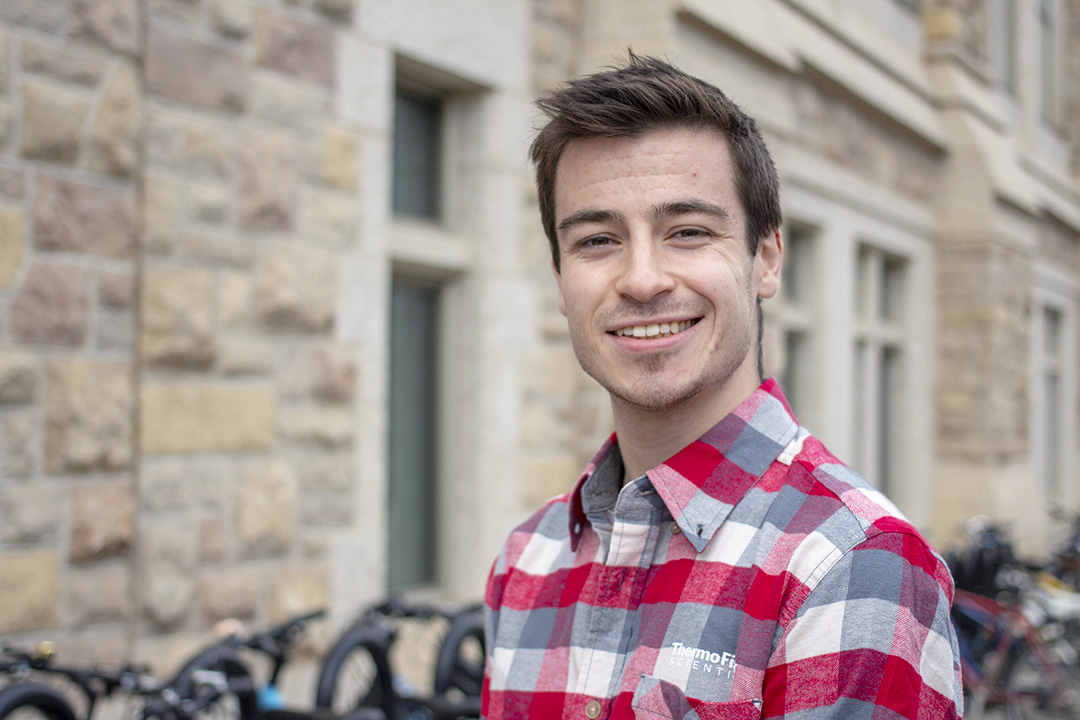
USask employee raising awareness about inflammatory bowel disease
As a research technician at the University of Saskatchewan (USask) Cell Signalling Laboratory, Ryan Heistad’s work is focused on Alzheimer’s disease.
By Shannon BoklaschukOutside of his employment at USask’s College of Medicine, however, the 23-year-old is focused on another health issue: Crohn’s disease. It’s a chronic condition that has greatly impacted his life since he was diagnosed with it four years ago.
“When I first received my diagnosis of Crohn’s disease I felt a range of emotions,” said Heistad. “I had never heard of inflammatory bowel disease until that point, so there was confusion and fear of what the future would hold for me. My biggest worry at the time was that I wouldn’t be able to hold onto a job, especially having just graduated from college.”
Still, despite worrying that potential health complications could interfere with his life, the diagnosis also provided some relief.
“I had known there had been something wrong with me for a while leading up to my diagnosis, and it was reassuring knowing that medical professionals were able to identify what that problem was,” said Heistad. “There was hope that I could move forward and begin getting my health, and life, back on track.”
Crohn’s disease and ulcerative colitis—the two main forms of inflammatory bowel disease (IBD)—inflame the lining of the gastrointestinal (GI) tract, disrupting an individual’s ability to digest food, absorb nutrition and eliminate waste in a healthy way. IBD can cause life-threatening complications and debilitating symptoms, including abdominal pain, bloating, nausea, diarrhea, vomiting, weight loss, bleeding, anemia, fever, severe fatigue, and joint inflammation, swelling and pain.
The biggest symptom Heistad experienced before receiving his Crohn’s disease diagnosis was constant pain. Some days he felt sharp abdominal pain “that stabbed like a knife,” while on other days he suffered from a dull pain that worsened the more he moved. The pain would intensify after he ate, leading him to skip meals. The pain also kept him up for most of the night, so he never felt fully rested and found even the smallest tasks exhausting.
Less than one month after getting his diagnosis, and following multiple trips to the ER, Heistad received emergency surgery. He underwent an intestinal resection procedure to remove the scarred sections of his small and large intestines. Heistad now sports a semicolon tattoo on his arm, a visual reminder of surviving the loss of some of his colon and the health obstacles he has had to overcome.
“Because my scar tissue was extensive, I required a rather invasive procedure. I was given a temporary ileostomy to divert my waste from my small and large bowels to allow my reconnections to heal. Once fully healed, my ostomy was reversed,” he said.
“While the surgery did wonders for my health, the reality is that IBD is a chronic disease and surgery is by no means a cure. I require regular colonoscopies to monitor the progression of my disease, and I must take a variety of immunosuppressant medications and biologic injections to prevent my condition from worsening.”

Heistad also finds support through his volunteer work with the Saskatoon chapter of Crohn’s and Colitis Canada, a national charity that aims to find a cure for IBD and improve the lives of children and adults affected by Crohn’s and colitis. One of his goals has been to raise awareness about IBD on the USask campus, especially among students who may be living with the conditions. He has set up Crohn’s and Colitis Canada booths in the tunnel in the Arts Building to provide information about IBD to passersby, and to inspire and encourage other young people.
Heistad is currently serving as president of the local chapter of the charity and is leading the organization through its largest fundraiser of the year. The 24th annual Saskatoon Gutsy Walk will take place in Meewasin Park on June 2.
“It is a chance to make a difference and help ease the lives of the people who live with this horrible disease,” he said. “In addition to raising funds for this amazing cause, it is your chance to meet other people and other families who were impacted by inflammatory bowel disease, learn their story and share your own.”
Today, Heistad’s health is back on track. Although he needs to take prescription medications and remains cautious about what he eats, he is working full time at USask and hasn’t experienced a major Crohn’s flare up in years.
“My message to anyone recently diagnosed with Crohn’s or colitis would be it gets better,” he said. “Anyone living with chronic disease knows that there are good days and bad. Unfortunately, the bad days can feel long, but there is always that hope and knowledge that, eventually, things will get better.”

